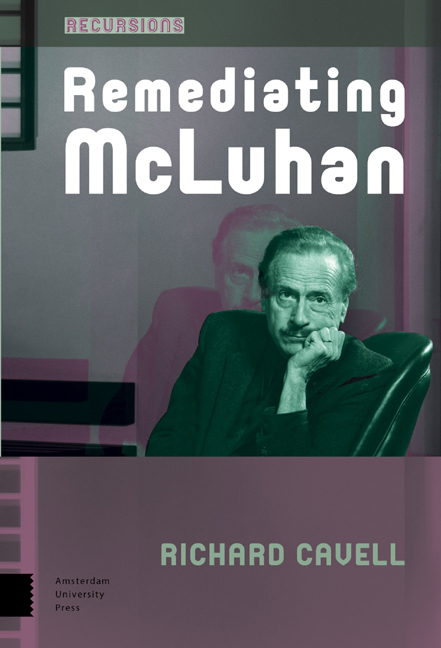Book contents
- Frontmatter
- Dedication
- Contents
- Introduction
- List of sigla
- I
- Re: Mediation
- 1 Beyond McLuhanism
- 2 McLuhan and the Question of the Book
- Embodiment as Incorporation
- 3 McLuhan and the Body as Medium
- 4 McLuhan, Tactility, and the Digital
- 5 Mechanical Brides and Vampire Squids
- Empathic Media
- 6 McLuhan: Motion: e-Motion: Towards a Soft Ontology of Media
- 7 Re-Mediating the Medium
- Determining Technology
- 8 McLuhan, Turing, and the Question of Determinism
- 9 Angels and Robots
- Being Mediated
- 10 Marshall McLuhan’s Echo-Criticism
- 11 McLuhan and the Technology of Being
- II
- 12 The Tragedy of Media: Nietzsche, McLuhan, Kittler
- Coda: On the 50th Anniversary of Understanding Media
- Notes
- Works Cited
- Index
8 - McLuhan, Turing, and the Question of Determinism
Published online by Cambridge University Press: 12 December 2020
- Frontmatter
- Dedication
- Contents
- Introduction
- List of sigla
- I
- Re: Mediation
- 1 Beyond McLuhanism
- 2 McLuhan and the Question of the Book
- Embodiment as Incorporation
- 3 McLuhan and the Body as Medium
- 4 McLuhan, Tactility, and the Digital
- 5 Mechanical Brides and Vampire Squids
- Empathic Media
- 6 McLuhan: Motion: e-Motion: Towards a Soft Ontology of Media
- 7 Re-Mediating the Medium
- Determining Technology
- 8 McLuhan, Turing, and the Question of Determinism
- 9 Angels and Robots
- Being Mediated
- 10 Marshall McLuhan’s Echo-Criticism
- 11 McLuhan and the Technology of Being
- II
- 12 The Tragedy of Media: Nietzsche, McLuhan, Kittler
- Coda: On the 50th Anniversary of Understanding Media
- Notes
- Works Cited
- Index
Summary
To attempt to provide rules of conduct to cover every eventuality, even those arising from traffic lights, appears to be impossible.
Alan Turing, ‘Computing Machinery and Intelligence’Lack of homogeneity in speed of information movement creates diversity of patterns of organization.
Marshall McLuhan, Understanding MediaMarshall McLuhan arrived at Cambridge University in the fall of 1934. He enrolled at Trinity Hall (Marchand, Marshall McLuhan, p. 38) and remained there until the summer of 1936, when he received his Bachelor's degree, having ‘set the foundations for almost all of his subsequent intellectual work’ (Marchand, p. 41). By extraordinary coincidence, Alan Turing, then a Fellow of King's College, was at the same time ‘supplement[ing] his fellowship by supervising undergraduates in next-door Trinity Hall’ (Hodges, Alan Turing, p.5). Their paths quite possibly crossed, although John Polanyi, who knew them both, states that McLuhan, ‘sadly’, never spoke of Turing. Biographical speculation aside, it is possible to argue that Cambridge's reputation as a hotbed of research in physics loomed large in their intellectual lives, even though the one had enrolled in Cambridge to study literature and the other mathematics.
It was particularly the question of determinism, put in play by the researchers in the Cavendish physics lab at the time that McLuhan and Turing were in Cambridge, that had a role in the formulation of their theories about mediation. While the question of determinism is visited today in media theory in terms of a debate about whether media ‘determine’ our situation, as Friedrich Kittler has put it (GFT, p. xxxix), at the time that McLuhan and Turing were students at Cambridge, the question of determinism had a distinctly philosophical dimension, and was often invoked in questions related to issues in physics and mathematics arising in the context of the breakdown of Newtonian physics in the face of the increasing understanding of quantum effects. For the purposes of this chapter, I am understanding ‘determinism’ as an aspect of media ‘traffic’, that is, in terms of the ‘signals’ that seek to control, or determine, the movement of that traffic. The metaphor of traffic was specifically invoked by Turing, and the question of media traffic, or movement, emerges in McLuhan’s formulation of the ‘laws’ of media.
- Type
- Chapter
- Information
- Remediating McLuhan , pp. 91 - 96Publisher: Amsterdam University PressPrint publication year: 2016



